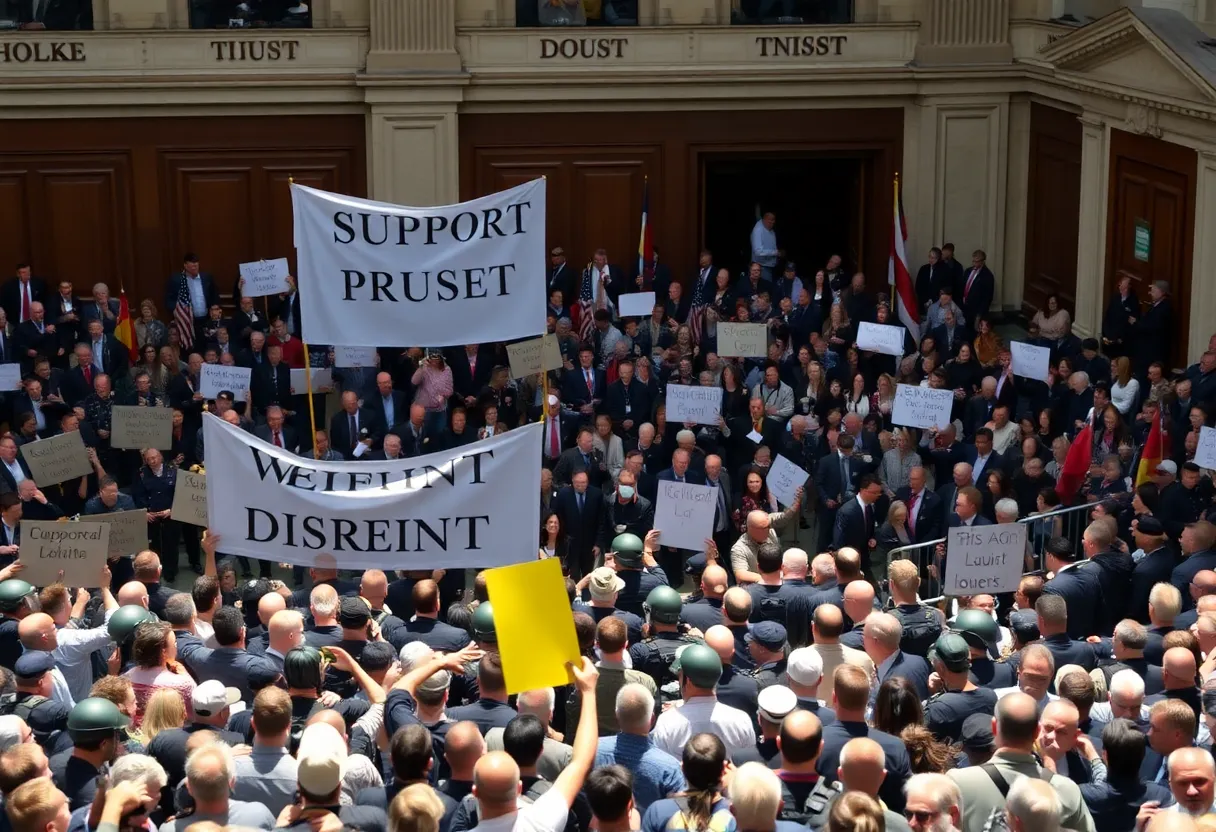

The inauguration of Nicolás Maduro, surrounded by supporters and opposition in a tense political atmosphere.
Nicolás Maduro was sworn in for a third presidential term amid allegations of electoral fraud following the controversial July 2024 elections. Despite being recognized as the winner by Venezuela’s electoral authorities, opposition groups claim that Edmundo Gonzalez actually secured a majority of the votes. International leaders attended the ceremony in a show of support, while the U.S. and other nations condemned the event, labeling it illegitimate. Protests erupted across Venezuela as opposition figures rallied against the government, signaling ongoing political turmoil in the country.
On Friday, Venezuelan leader Nicolás Maduro took an oath for a third presidential term amid widespread controversy and accusations of electoral fraud following the July 28, 2024 election. The swearing-in ceremony was notably different this time, occurring in a small meeting room of the National Assembly rather than the grand halls typically associated with such events.
The event was officiated by the National Assembly leader, Jorge Rodríguez, who placed the presidential sash around Maduro’s shoulders, drawing applause from his supporters present. During his inaugural speech, Maduro emphasized his belief that his legitimacy came not from any external actors, declaring his commitment to Venezuela’s sovereignty.
Adding to the proceedings’ aura of international significance, leaders from Nicaragua and Cuba, including Daniel Ortega and Miguel Díaz-Canel, were in attendance, along with officials from China and Russia. They showed solidarity with Maduro, despite the contentious background surrounding his election.
Venezuela’s electoral authorities, aligned with Maduro’s Socialist Party, declared him the election’s winner. However, independent observers and opposition groups allege a different story, claiming that opposition candidate Edmundo Gonzalez actually received around 67% of the votes compared to Maduro’s mere 30%. These numbers were reportedly derived from leaked voting tallies, casting further doubt on the legitimacy of Maduro’s victory.
The situation escalated further as the United States and various other nations opted to recognize Gonzalez as the rightful president-elect, refusing to acknowledge Maduro’s claim to power. Opposition leader María Corina Machado sharply criticized the inauguration, framing it as a violation of the country’s constitution and calling for sustained pressure against the Maduro government.
The Biden administration also condemned Maduro’s inauguration, referring to it as “illegitimate” and opting to impose new sanctions on individuals associated with him. Following the disputed election results, an arrest warrant was issued for Gonzalez after he fled Venezuela in September, with accusations that Maduro’s regime targeted him for his electoral gains. Gonzalez’s security concerns kept him from returning to Venezuela to challenge the inauguration.
In a response to the escalating crisis, the U.S. has extended Temporary Protected Status for eligible Venezuelan nationals, providing temporary relief amid the political turmoil. Several countries, including the UK, EU, and Canada, have imposed sanctions on Maduro and his administration, recognizing the significant threat that the undermining of democracy poses to the region.
Following the inauguration, protests erupted in Caracas and other cities. Opposition figures like Machado emerged from hiding, rallying supporters to voice their discontent. However, reports indicated that Machado was intercepted by police during one of the protests, an event that the government denied despite eyewitness accounts supporting her claims.
In a cheeky jab, Maduro labeled the current wave of dissent as “Guaidó 2.0,” referencing the previous opposition leader who claimed the presidency in 2019. This indicates that Maduro is not oblivious to the potential for continued opposition, even as he asserts control.
The international community, including the G7 nations, expressed collective condemnation of the inauguration, emphasizing the absence of democratic legitimacy in the electoral process. In preparation for the unfolding situation, Venezuela’s government even closed borders and suspended flights to Colombia, accusing foreign nations of coordinating a conspiracy against it.
With a backdrop of increased repression, evidenced by over 2,000 detentions during post-election protests, the United Nations and various human rights organizations voiced concerns regarding political dissent in Venezuela. Despite the oppressive climate, opposition leaders remain resolved to continue their fight for democracy, rallying increasing public sentiment for change.
News Summary On a normal Thursday evening, an Amtrak train struck three family members in…
News Summary In a significant development, GOP Representative Anna Paulina Luna is advocating for remote…
News Summary A Michigan couple, Paul and Christy Akeo, spent nearly a month in a…
News Summary Communities from Kentucky to Missouri are reeling from a devastating tornado outbreak that…
News Summary The Trump administration has fired General Timothy Haugh, the director of the NSA,…
News Summary The annual CORK wine festival in Shreveport has been rescheduled to April 6,…